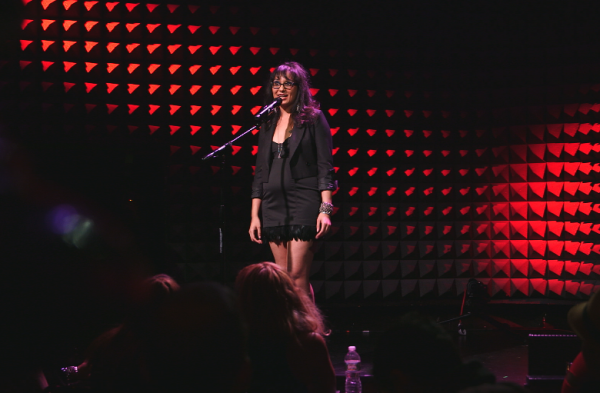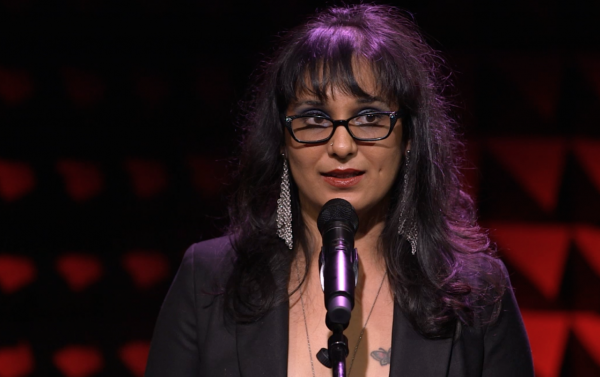
Anna Saini is a community organizer with Voices of Community Activists and Leaders – New York (VOCAL-NY), where she works towards ending the drug war, mass incarceration and racist policing. Her writing appears in Bitch magazine, make/shift magazine, the forthcoming Dear Sister Anthology, her self published anthology Colored Girls, as well as both Red Umbrella Project writing workshop literary anthologies, Prose and Lore issues One & Two. She is a Brown and proud captivating performer, a veteran Red Umbrella Diaries storyteller who is featured along with six other sex worker storytellers in the upcoming documentary, “The Red Umbrella Diaries: A documentary about sex worker stories.” Writing can be a great vehicle for social change and Anna’s work is an example of this kind of activism.
Sometimes you have to reach back into an uncomfortable past to make meaning out of it. You’re a contributor to the forthcoming anthology Dear Sister, about healing from sexual assault. What did you share in it about your healing process?
The call-out for submissions for the anthology presented the opportunity to write a letter saying whatever you always wanted to say to another survivor. I know that often when we think of a “survivor” the expectation is that the person is valiant, strong and resilient. I wanted to talk about the flip-side of survival, the part that many consider ugly or uninspiring, the part that breaks down these myths about who we are.
I wanted to say what people don’t say about surviving, so that I could feel less alone in the experience and reach out to others so that they could also feel less alone. A lot of folks who have survived violence that I’ve known are damaged in some kind of way. Instead of ignoring that damage, I wanted to acknowledge it, maybe even revel in it. I wanted to talk about that damage, explain what it looks like on me.
While you moonlight as a storyteller and writer, your full-time job is as a community organizer with an organization called Voices of Community Activists and Leaders – New York (VOCAL-NY). What kind of work do you do there?
I’m really blessed to have a job with VOCAL because every single day I go to work I’m working on issues I care about with people and communities that are important to me. As an organization our mission is to end the drug war, end mass incarceration, and end the HIV/AIDS epidemic. We do this by building power among communities that are directly impacted by these issues. So we work with a lot of awesome low-income folks, folks of color and people living with HIV/AIDS.
That’s part one of why my job rules—I love my team. Part two is that I get to talk all day every day about one of my favorite topics: weed. I’m a statewide organizer working to pass a bill that would provide safe and legal access to medical marijuana for seriously ill New Yorkers. I spend most of my days empowering sick and dis/abled people to have their voices heard.
So, basically I make my living working with amazing folks to win on issues that are important to us. Definitely I’m down with dismantling capitalism but in the meantime, it’s a sweet gig. It’s a great way to pay the bills.
On top of all of all this, you also participate with Red Umbrella Project—it’s where we first met. What first got you involved in the Red Umbrella Project?
I saw another sex worker tweet about the Red Umbrella Project Media Training. I think it was only the second media workshop ever offered. Red Umbrella Project was in its nascent stages at that time, but I think there was immediate interest in the community building that was happening there. RedUP isn’t a support group and it’s not an organization trying to save the souls of prostitutes. Sex work is often isolating for folks and RedUP is a rare place where sex workers can come together. I was drawn to Red Umbrella Project because it was obvious that they were soliciting the participation of folks like me, people who see their sex work as an important part of their identity but also see themselves as bigger than the superficial labels and conceptions that go along with sex work. RedUP brings a lot of different people together who all have their own reasons for wanting to break down stereotypes about sex workers by telling our own stories.

Another place where we can find your writing is in the first and second volumes of Prose & Lore, a literary journal of memoir stories about sex work. Each of these volumes were produced as the culmination of an eight-week workshop with Red Umbrella Project. What was the workshop experience like?
The workshop experience was really important to my development as a writer and really nourishing to me as a person. For one night a week I was sharing a space with many other sex workers, all of us from different backgrounds, representing many different sectors of the sex trade.
As a community organizer I know how powerful it is for sex workers who represent all different kinds of experiences and communities to come together and join forces. We demonstrate without question that a “sex worker” is not any one kind of person coming from any one kind of background. A lot of times sex worker spaces are stratified according to race, class, sector of the industry and a whole host of other factors. I know that the organization is not accessible to every sex worker, that’s a goal to strive toward, but I also know that RedUP is one of the few places that recognizes and celebrates difference among sex workers. I’ve met a lot of different folks through RedUp (including you!) that I feel really blessed to call friends.
Because we’re all just sex workers sharing our experiences at RedUP, it’s become a super comfortable and vital place for me to receive input on my work. Since a lot of my writing is about my experiences in the sex trade, I need feedback from my colleagues to shape the work, since non-sex workers often lack a baseline of understanding about the industry to give me notes about authenticity and veracity. Once we’re wrapped on the Red Umbrella Project showcase and documentary I’m definitely looking to get back into the workshop space so I can get back into my writing grind! The next cycle of the eight-week Red UP memoir writing workshop starts March 3rd, 2014 and applications are open to folks with experiences (current or former) in the sex trade. In the meantime, I’m really looking forward to the new issue of Prose & Lore launching this January. And folks should know there will be another open call for submissions to Prose & Lore in the new year, so if you have experiences in the sex trade and story you want to share, you can pitch it to Red UP for publication without having attended the workshops.
You were one of seven Red Umbrella Diaries performers featured in the November 14th showcase at the legendary Joe’s Pub here in New York City. A documentary film crew followed you and your fellow storytellers throughout the rehearsal process. How was it performing at the biggest Red UP venue to date? Can you tell us more about your experience being featured in the documentary?
It was definitely a surreal, awesome and sometimes mortifying experience having cameras follow us around! I’m somewhat fearful and embarrassed in advance about what they managed to capture for the film! Ultimately, despite all the dread I felt leading up to the performance and throughout this process of making the documentary, I’m deeply honored to be in this position of speaking my truth.
I’m also actually grateful that the cameras were there, documenting all the different stages of our progress, asking us questions and enabling us to reflect on what was happening and what we were accomplishing in the moment. It’s hard and scary to think about how much of myself will be on the screen— how much of the real me, unfettered, unpolished and uncensored. From the early rehearsals to the end product at Joe’s Pub, I’m glad that there’s a record of all the ways my work grew, developed and changed throughout.
I can honestly say that the story I shared at the showcase was the best version of it I’d ever rehearsed and that I was able to communicate so much about who I am and my experience as a sex worker, more than I thought was possible. Through collaboration with my fellow storytellers, we created such a rich tapestry of what “sex worker” means. Every single person who hit the stage gave complexity and nuance to the topic, which is so rare when talking about the sex trade. To share all of that in front of an audience of about 200 people – including fellow sex workers, loved ones, friends and colleagues from the social justice world – that was an incredible bonus. As uncomfortable as it is for me to step out of my introvert shell and put myself on blast like this, I know what we’re creating is vitally important to ourselves and our communities. Filmmakers are aiming toward a Spring 2015 release date for the documentary but curious folks can visit redumbrelladiaries.com for the latest news and updates.
What’s next for you and your stories?
Mad props to you Ms. Saini! I’ve been watching the red umbrella developments from afar and was inspired to see such an outspoken articulate lady like yourself be in the spotlight! Also, as a POC, It’s about damn time TAS featured a “brown and proud” person in the activist spotlight. I like TAS but I feel they should be more inclusive of POC that are making moves and doing just as much bad ass stuff as white folks and Anna and Deon Haywood just to name a few are great examples of this.
You’ll probably enjoy our upcoming Asian sex workers’ round table, then, moderated by Mariko Passion, and a piece coming up about the historic Caribbean sex workers’ rights conference with its Montego Bay declaration. We’re making a concerted effort to feature the work of POC sex workers, but you’re right, there’s still a lot of room for improvement.
Not that there isn’t room for improvement, since there is for sure – but also you did interview Deon Haywood (and Sophia St James, Tracy Quan, etc.).